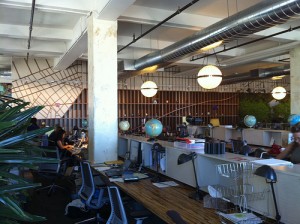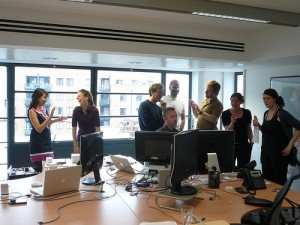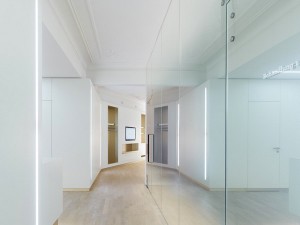Facebook recently announced their new office space, which will cover ten acres, house 3000 workers, and be "the largest open floor plan in the world," according to Mark Zuckerberg. And while the social media giant might be planning the biggest open plan office yet, they're certainly not alone in embracing the new, cubicle-free way of doing business. The question is, should your company make the transition? Here's what to consider.

Pros:
Cost: This is possibly the biggest benefit for cost-conscious companies. It's far cheaper to use an open office plan than it is to use cubicles or private offices. Open offices are more scalable: managers can add new employees without building new walls. And, as this CNN article points out, they're far cheaper to heat -- no mean savings in these times of skyrocketing fuel prices.
Collaboration: For companies that rely on teamwork and creativity, the open office offers a unique opportunity to foster group communication. Many open offices have movable furniture and a variety of different kinds of work spaces -- from long tables to private conference rooms -- that can be booked for small brainstorming sessions. All of this allows workers to structure their space around their work, instead of vice versa.

Cons:
Noise: Open plan offices can be LOUD. Even if every single person who works in a given office knows how to use his or her indoor voice, all of that low-level chatter can be deafening in an open room. If you have a lot of folks who need to be heads-down in a silent environment, it might be difficult to accommodate them. If you do opt for an open plan office, then, the best thing to do is to invest in sound-masking equipment, which will cover the chatter with soothing white noise and allow people to work in peace. We'd also recommend that anyone who switches to an open work environment offer workers a few private places to make phone calls and meet in small groups.
Lack of Personality: Another downside to open offices is that people don't have a space to call their own, which can make even the coolest décor feel oddly impersonal. Consider allowing workers to personalize some part of the office, whether it's bringing in pictures of their family or having a hand in decorating the lunchroom.

Before You Plan an Open Office:
If the pros of switching to an open plan office outweigh the cons, ask yourself these questions before drawing up plans:
1. What kinds of work do my employees do? Are they engaged mostly in group projects, or do they tend to work solo?
2. How many meetings do we have on a weekly basis, and do we need private space for each?
3. Is there a place people can go to in order to make a phone call, meet with a small group, or even have an argument?
4. Will there be opportunities to personalize the space?
5. How are the acoustics in the space, as is, and what can we do to mitigate noise?
Images: Shawn Allen/Flickr, Lars Ploughmann/Flickr, Rey BangoFlickr





